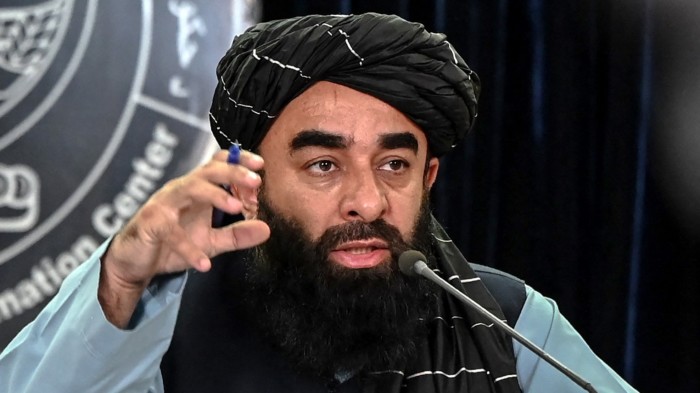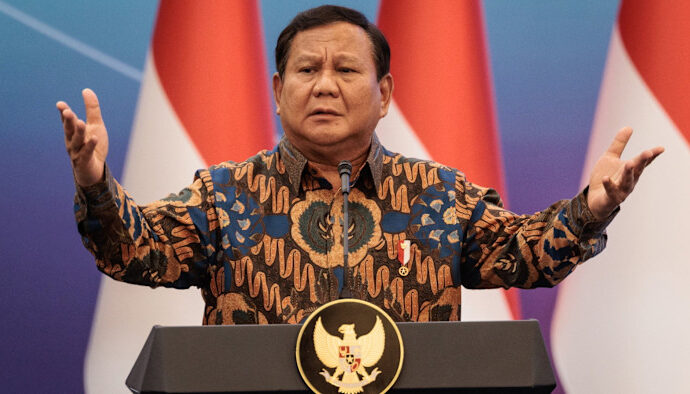
Unlock the White House Watch newsletter for free
Your guide to what Trump’s second term means for Washington, business and the world
Pakistan said on Sunday that 23 of its soldiers were killed during overnight clashes with Afghan forces, after Afghanistan said it instigated cross-border retaliation for an alleged strike by Pakistan last week on Kabul.
Afghanistan’s Taliban-led government launched what it called a “retaliatory operation” late on Saturday by crossing the countries’ shared 2,600km border to shoot at Pakistani forces.
Pakistan responded, including with cross-border raids and rocket fire, in the most intense fighting between the neighbours since the Taliban returned to power.
Relations between Afghanistan and Pakistan have nosedived in recent months as Islamabad accuses the Afghan Taliban, which it had backed during the latter group’s 20-year war against Nato forces, of failing to rein in the Tehrik-e-Taliban Pakistan, known as TTP, or Baloch separatist groups operating from its soil.
The Pakistan Armed Forces said 23 of its forces died and 29 were injured in the overnight skirmish. They alleged that more than 200 Afghan Taliban, TTP and Baloch separatist fighters were killed.
Zabihullah Mujahid, spokesperson for the Taliban government, earlier said in a press conference in Kabul that Afghan forces had crossed the border to target military posts. He claimed 58 Pakistani soldiers died, while 20 Afghan troops were killed or injured.
“The situation on all official borders and de facto lines of Afghanistan is under complete control, and illegal activities have been largely prevented,” he said. Qatar and other “friendly, Islamic countries” intervened to help secure a ceasefire around midnight, Mujahid said.
A Pakistani military statement called Afghanistan’s actions a “serious provocation” and noted it occurred during the visit of Taliban foreign minister Amir Khan Muttaqi to India.
“If the Taliban government continues to sponsor terrorist outfits . . . in [cahoots] with India . . . the state of Pakistan will not rest until the menace of terrorism emanating from Afghanistan is completely eliminated,” the statement said.
India denies allegations of sponsoring terrorism and says Pakistan is trying to deflect from its involvement in militancy in Indian-administered Kashmir — an accusation Islamabad rejects.
The Afghan Taliban have repeatedly said they do not allow their soil to be used for terrorism against other countries, and have said militancy is an internal issue for Pakistan.
Saturday’s clashes come after Taliban officials said the “sound of an explosion” was heard in Kabul on Thursday. The next day Afghanistan’s defence ministry accused Pakistan of “violating the air space” over Kabul and bombing a “civilian market” near the border.
Pakistan’s military did not confirm or deny their involvement in Thursday’s air strike.
Muttaqi told reporters in New Delhi that Afghanistan “achieved the objective of our retaliatory operations”. He reiterated the Taliban’s claim that “there are no TTP safe havens in Afghanistan”.
Ishaq Dar, Pakistan’s deputy prime minister and foreign minister, wrote on social media platform X that during Saturday’s clashes Pakistan hit Afghan Taliban infrastructure, as well as TTP and Baloch separatist hide-outs in Afghanistan.
“Our defensive response is not targeted towards peace loving Afghan civilian population. Unlike Taliban Forces, we are exercising extreme caution in our defensive responses to avoid loss of civilian lives,” he wrote.
In a statement on Sunday Hamdullah Fitrat, the deputy spokesperson for the Taliban government, blamed “a dominant faction within the Pakistani military” for seeking to destabilise Afghanistan by recruiting regime opponents, launching air strikes, and “wilfully” ignoring hide-outs used by militant group Isis-KP in Pakistan.
Fitrat demanded that Islamabad expel four Isis-KP leaders that Kabul alleges are in Pakistan.
Pakistan, and most of the international community, says Isis-KP operates out of ungoverned pockets of Afghanistan. The Taliban have launched a counterterrorism campaign to eradicate the group, which has been responsible for deadly attacks in Afghanistan, Iran, Russia and Pakistan.
This year, about 900 Pakistani security forces and more than 500 civilians have already been killed by insurgents near Pakistan’s porous western border, according to the South Asia Terrorism Portal, the highest number since 2009.
Both sides have engaged in border skirmishes before, and Pakistan has since last year been linked to multiple air and drone strikes against alleged militant camps on the Afghan side of the border. Islamabad has openly acknowledged at least one such attack.
The foreign ministry of Saudi Arabia, which signed a mutual defence pact with Pakistan last month, called in a statement for “restraint, the avoidance of escalation, and the adoption of dialogue and wisdom”.


